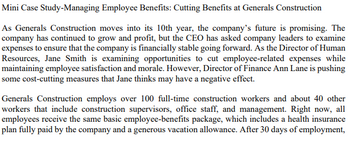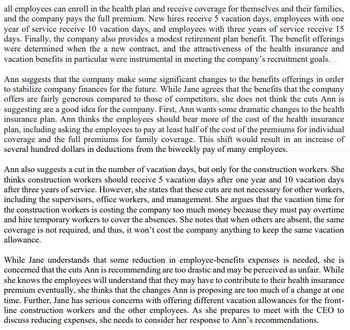
Understanding Business
12th Edition
ISBN: 9781259929434
Author: William Nickels
Publisher: McGraw-Hill Education
expand_more
expand_more
format_list_bulleted
Question
Does Jane have a valid concern? Use scholarly articles to support your answer.

Transcribed Image Text:Mini Case Study-Managing Employee Benefits: Cutting Benefits at Generals Construction
As Generals Construction moves into its 10th year, the company's future is promising. The
company has continued to grow and profit, but the CEO has asked company leaders to examine
expenses to ensure that the company is financially stable going forward. As the Director of Human
Resources, Jane Smith is examining opportunities to cut employee-related expenses while
maintaining employee satisfaction and morale. However, Director of Finance Ann Lane is pushing
some cost-cutting measures that Jane thinks may have a negative effect.
Generals Construction employs over 100 full-time construction workers and about 40 other
workers that include construction supervisors, office staff, and management. Right now, all
employees receive the same basic employee-benefits package, which includes a health insurance
plan fully paid by the company and a generous vacation allowance. After 30 days of employment,

Transcribed Image Text:all employees can enroll in the health plan and receive coverage for themselves and their families,
and the company pays the full premium. New hires receive 5 vacation days, employees with one
year of service receive 10 vacation days, and employees with three years of service receive 15
days. Finally, the company also provides a modest retirement plan benefit. The benefit offerings
were determined when the a new contract, and the attractiveness of the health insurance and
vacation benefits in particular were instrumental in meeting the company's recruitment goals.
empl
yees receive the same basic employee-benefits package, which includes a health
Ann suggests that the company make some significant changes to the benefits offerings in order
to stabilize company finances for the future. While Jane agrees that the benefits that the company
offers are fairly generous compared to those of competitors, she does not think the cuts Ann is
suggesting are a good idea for the company. First, Ann wants some dramatic changes to the health
insurance plan. Ann thinks the employees should bear more of the cost of the health insurance
plan, including asking the employees to pay at least half of the cost of the premiums for individual
coverage and the full premiums for family coverage. This shift would result in an increase of
several hundred dollars in deductions from the biweekly pay of many employees.
Ann also suggests a cut in the number of vacation days, but only for the construction workers. She
thinks construction workers should receive 5 vacation days after one year and 10 vacation days
after three years of service. However, she states that these cuts are not necessary for other workers,
including the supervisors, office workers, and management. She argues that the vacation time for
the construction workers is costing the company too much money because they must pay overtime
and hire temporary workers to cover the absences. She notes that when others are absent, the same
coverage is not required, and thus, it won't cost the company anything to keep the same vacation
allowance.
While Jane understands that some reduction in employee-benefits expenses is needed, she is
concerned that the cuts Ann is recommending are too drastic and may be perceived as unfair. While
she knows the employees will understand that they may have to contribute to their health insurance
premium eventually, she thinks that the changes Ann is proposing are too much of a change at one
time. Further, Jane has serious concerns with offering different vacation allowances for the front-
line construction workers and the other employees. As she prepares to meet with the CEO to
discuss reducing expenses, she needs to consider her response to Ann's recommendations.
SAVE
AI-Generated Solution
info
AI-generated content may present inaccurate or offensive content that does not represent bartleby’s views.
Unlock instant AI solutions
Tap the button
to generate a solution
to generate a solution
Click the button to generate
a solution
a solution
Knowledge Booster
Similar questions
- 4. Claire is very interested in strengthening the social and environmental aspects of their business and has asked you to advise her on this. Explain to her how the societal marketing concept could apply to their business. What changes could she make to TWO aspects of the marketing mix to strengthen the environmental and social credentials of the business. [Guidance to students: Use concepts from B100 Reading 36 to help you with this answer. Start by explaining what is meant by the societal marketing context. Try to use your own words in doing so and make sure you add a reference. Then explain how the societal marketing concept can apply to Susan and Claire's coffee shop. What would they have to do in order to follow the societal marketing concept? Then recommend changes to TWO aspects of the marketing mix that would allow Claire to improve the social and environmental performance of their business. You can think about any two aspects of the marketing mix. Perhaps more could be done to…arrow_forwardWhat is the difference between an argument and an opinion?arrow_forwardAnswer the following critical thinking question from chapter 6 by using your textbook with citations (see the example listed).. Minimum requires are 2/4 substantial double-spaced paragraphs. Always support your answers. Chapter 6/ ppts 6-20 critical thinking assignment: Name the five stages in the consumer decision process. Be sure to follow the example and cite.arrow_forward
- Assume you are in an organization that is experiencing difficulty competing with others within a particular industry as a result of the entry of several new competitors into the market. You have been tasked by the organization's leadership with developing a creative marketing solution.Develop a creative approach for improving specific processes, and utilize inductive arguments to support the proposed solution. The response should include one of the following: generalization, analogy, or causal argument.arrow_forwardWrite a 350- to 700-word review of the article. Your review should discuss how the SOX Act may affect ethical decision making in today’s business environment, and the criminal penalties for which the act provides. Format your paper consistent with APA guidelines.arrow_forwardSelect a peer reviewed journal article on burntout. Provide a summary of the article and include a critique of the limitations of the study. Discuss why this information is important to generalist practice. Is there a need for additional studies on this topic?arrow_forward
- Which of the following are possible reasons why there are nonprofit organizations? (please choose all that apply) Select 4 correct answer(s) Asymmetric information and a failure of trust Nonprofit as for-profit in disguise The altruistic-motive theory The government-failure theoryarrow_forwardAssume you are in an organization that is experiencing difficulty competing with others within a particular industry as a result of the entry of several new competitors into the market. You have been tasked by the organization's leadership with developing a creative marketing solution. Utilize deductive arguments to support the proposed solution. The response should include one of the following: hypothetical syllogism, categorical syllogism, argument by elimination, an argument based on mathematics, or argument from the definition.arrow_forwardRead the Kifner article published in the New York Times. The PDF of the article is posted in this week's module. Then... Summarize the article. Describe how the researcher violated one or more of the principles of ethical human subjects research (i.e., beneficence, justice, and/or respect for persons). What ethical lessons should be learned from this story? How do you think the institutional review board (IRB) would have responded to this proposal if he had submitted it properly?arrow_forward
- For what reasons is Google seen as Pinterest's main competitor? To what end does Pinterest give special consideration to mobile devices while developing new features and products?arrow_forwardCreate a company name and determine its market segment. Using a narrative style (text) Business Motivational Model (BMM), create a BBM model with the following attributes: Ends: Vision Statement- only one is required Desired Results (Goals and Objectives) - at least 2 goals, and at least 2 objectives for each goal Means: Mission Statement - at least one Courses of action (Strategies and Tactics)- at least two of each Directives (Business Policies and Business Rules)- at least 4 of each External Influencers- at least two Internal Influencers- at least two Create a company name and determine its market segment. Using a narrative style (text) Business Motivational Model (BMM), create a BBM model with the following attributes: Ends: Vision Statement- only one is required Desired Results (Goals and Objectives) - at least 2 goals, and at least 2 objectives for each goal Means: Mission Statement - at least one Courses of action (Strategies and Tactics)- at least two of each…arrow_forwardHow do you think that different beauty trends affect popularity? For example, what if a certain trait is considered attractive at one point in time, but then later different traits are considered attractive? Could someone not considered to be popular "become popular" based on changing beauty trends/standards?arrow_forward
arrow_back_ios
arrow_forward_ios
Recommended textbooks for you
 Understanding BusinessManagementISBN:9781259929434Author:William NickelsPublisher:McGraw-Hill Education
Understanding BusinessManagementISBN:9781259929434Author:William NickelsPublisher:McGraw-Hill Education Management (14th Edition)ManagementISBN:9780134527604Author:Stephen P. Robbins, Mary A. CoulterPublisher:PEARSON
Management (14th Edition)ManagementISBN:9780134527604Author:Stephen P. Robbins, Mary A. CoulterPublisher:PEARSON Spreadsheet Modeling & Decision Analysis: A Pract...ManagementISBN:9781305947412Author:Cliff RagsdalePublisher:Cengage Learning
Spreadsheet Modeling & Decision Analysis: A Pract...ManagementISBN:9781305947412Author:Cliff RagsdalePublisher:Cengage Learning Management Information Systems: Managing The Digi...ManagementISBN:9780135191798Author:Kenneth C. Laudon, Jane P. LaudonPublisher:PEARSON
Management Information Systems: Managing The Digi...ManagementISBN:9780135191798Author:Kenneth C. Laudon, Jane P. LaudonPublisher:PEARSON Business Essentials (12th Edition) (What's New in...ManagementISBN:9780134728391Author:Ronald J. Ebert, Ricky W. GriffinPublisher:PEARSON
Business Essentials (12th Edition) (What's New in...ManagementISBN:9780134728391Author:Ronald J. Ebert, Ricky W. GriffinPublisher:PEARSON Fundamentals of Management (10th Edition)ManagementISBN:9780134237473Author:Stephen P. Robbins, Mary A. Coulter, David A. De CenzoPublisher:PEARSON
Fundamentals of Management (10th Edition)ManagementISBN:9780134237473Author:Stephen P. Robbins, Mary A. Coulter, David A. De CenzoPublisher:PEARSON

Understanding Business
Management
ISBN:9781259929434
Author:William Nickels
Publisher:McGraw-Hill Education

Management (14th Edition)
Management
ISBN:9780134527604
Author:Stephen P. Robbins, Mary A. Coulter
Publisher:PEARSON

Spreadsheet Modeling & Decision Analysis: A Pract...
Management
ISBN:9781305947412
Author:Cliff Ragsdale
Publisher:Cengage Learning

Management Information Systems: Managing The Digi...
Management
ISBN:9780135191798
Author:Kenneth C. Laudon, Jane P. Laudon
Publisher:PEARSON

Business Essentials (12th Edition) (What's New in...
Management
ISBN:9780134728391
Author:Ronald J. Ebert, Ricky W. Griffin
Publisher:PEARSON

Fundamentals of Management (10th Edition)
Management
ISBN:9780134237473
Author:Stephen P. Robbins, Mary A. Coulter, David A. De Cenzo
Publisher:PEARSON